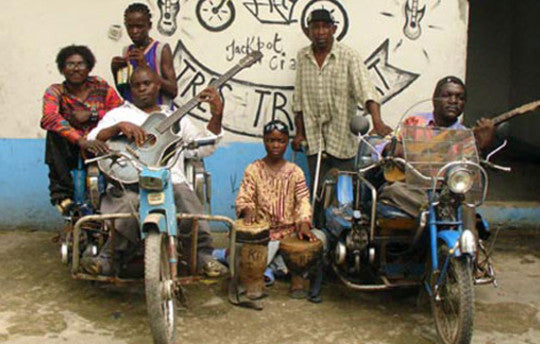Your Cart is Empty

A new feature film documenting the rise of the Congolese band, ‘Staff Benda Bilili’ to international fame is showing in UK Cinemas from March 18 2011.
Staff Benda Bilili are an ensemble of street musicians from the urban soundscape of The Democratic Republic of the Congo’s capital city, Kinhasa. The band’s debut album, ‘Très Très Fort’ offers up a collection of thick funk and blues-infused grooves combined with infectious rumba sensibilities and an occasional laidback reggae feel. The music is at once riotously energetic and gently lilting. The band were a main-stay on 2010’s summer festival circuit across Europe. Their performances at both Glastonbury and Womad last year were tight and slickly delivered. Staff Benda Bilili’s music is un-paralleled and reflects a chasm of influences whilst trade-marking an entirely new and unique sound.
The film, ‘Benda Bilili !’ is the result of five years of work by French film-makers Florent de La Tullaye and Renaud Barret. The work is filmed in the grounds of the Kinhasa zoo where the band live and rehearse. The film attempts to sensitively portray the lives of the band members and their struggles with handicap, poverty and personal issues. The band is composed of four lead singers and guitarists all of whom are paraplegic and perform on stage on customised tricycles. The rest of the band is made up of ex-sheges - abandoned street children, who the older of members of the band took under their collective wing. The youngest band member is Roger Landu who plays a home-made instrument called a satonge. The instrument is made from a milk can, a piece of wood and a tightened wire. Landu’s use of timbre and expanse of expression on this instrument mark him out as a supreme musical talent. It is no exaggeration to equate his performances to that of Hendrix and Santana. Such musical comparisons fail to convey the individuality of Landu’s style but act as helpful markers of this instrumentalist’s level of immense skill all the same.
The film received a standing ovation at Cannes Film Festival and a wealth of positive reviews. On March 11th the UK preview took place at The Union Chapel followed by a live gig by the band. In live performance Staff Benda Bilili exude an aura of cool off-hand talent. They make occasional reference to their handicap, acknowledging this association as a key aesthetic of their image. Tracks such as ‘Polio’ are nuanced with a doubled sense of melancholy and optimism for the future. Indeed the band’s name, Staff Benda Bilili translates as ‘look beyond appearances’, a direct reflection of their artistic intention to encourage understanding and acceptance among all peoples. Yet, there is a strong risk of creating spectacle in the portrayal of the bands disability in this film. Staff Benda Bilili’s music alone marks them out as remarkable artists, and their unusual back-story is and should be presented as secondary to this. This issue is a line the film-makers will have to tread carefully in order to pull off a biographic slant.
‘Benda Bilili !’ looks set to be one of the most charming and intriguing musical documentaries of recent years. The release of the film coincides with Staff Benda Bilili’s tour of Europe throughout March to April 2011.